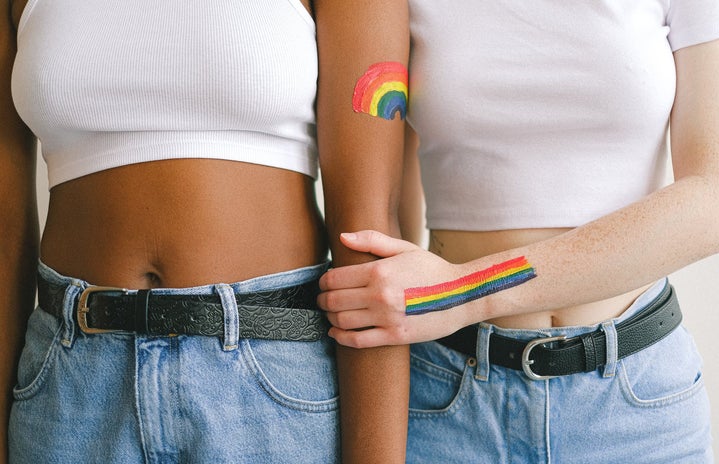Of all the 12 months, June is the most colorful. During these rainbow-filled 30 days, members and allies of the LGBTQIA+ community get together and celebrate all forms of love and identities. For decades now, the month of June has been consumed by overwhelming joy, love and pride.
And also money.
What started as riots at Stonewall in 1969, Pride month is now a golden opportunity for massive corporations to profit off the LGBTQIA+ movement.
With rainbow-themed products, companies attempt to gain the support of queer individuals and their allies. However, what may appear as a light-hearted way to attract customers can actually bring serious repercussions to the LGBTQIA+ community.
Amazon, AT&T, Target and Walmart are only a few businesses which partake in this marketing strategy, otherwise known as Rainbow Capitalism.
But what exactly is Rainbow Capitalism?
The LGBTQIA+ community still has a lot to fight for, but identifying as queer today is significantly easier and safer than it was several years ago.
Alex Abad-Santos, writer of How LGBTQ Pride Month became a branded holiday, discusses how, due to the movement’s progress and the general improvement of gay people’s rights, the real purpose of Pride month has been forgotten. For many, June has become less of an awareness month towards the struggles LGBTQIA+ members face, and more of a 30-day-long party.
That partially justifies why it feels as if a rainbow puked all over Target, and why your Listerine bottle looks ready for a Mardi Gras parade. After all, “it’s a hell of a lot easier to commodify a party than it is a political act.”
As Pride month became increasingly popular, corporations saw an opportunity to get ahead of their competitors by adopting colorful marketing strategies. For example, many change their logos to mimic rainbows and call it a Pride flag.
Marketing strategists believe that between rainbow-themed merchandise and a regular packaged commodity, customers would probably purchase the LGBTQIA+ friendly item. This allows organizations to profit massively from a movement that goes way beyond rainbows.

The issue with Rainbow Capitalism
The core issue of Rainbow Capitalism is that it commercializes queer culture.
Fran Tirado, writer and LGBTQIA+ advocate, told Good Morning America that “brands are commodifying our identities, commodifying our oppression. The most marginalized of our communities are being taken advantage of.”
Moreover, it has been proven that massive corporations use Rainbow Capitalism as a disguise to hide their moral and ethical standpoints.
Companies such as Amazon, AT&T and Walmart went the extra mile to exhibit their support for the LGBTQIA+ community. Some of the measures taken include rainbow-ish logos, colorful social media accounts and Pride collections.
But behind what appears to be queer friendly and loving businesses lies a cruel truth.
In February the Equality Act, which “would provide consistent and explicit anti-discrimination protections for LGBTQ people across key areas of life,” passed in the House of Representatives. All but three Republicans did not support the act.
During Pride month Amazon featured logos such as “Alexa, Open Pride History,” and “Join Amazon in celebrating love, community, and diversity.” They even launched a “Pride Store.” Yet, the same company donated over $450,000 to politicians who opposed the Equality Act. This left consumers wondering: Where was this so-called allyship when the corporation bank-rolled representatives who voted against the act?
Similarly, AT&T engaged in Pride-themed marketing campaigns and even sponsored the 2021 New York City Pride March organizers. Nonetheless, the same enterprise “provided a huge boost to Republican politicians trying to prevent a federal law that would protect LGBTQ+ people” according to Mona Chalabi, writer for The Guardian. AT&T also granted $56,295 to Mitch Mcconnel, who refused to bring the Equality Act to the Senate floor.
Not only are massive corporations making millions of dollars from the queer experience, they are also actively harming the community by choosing to support politicians who outrightly deny LGBTQIA+ members basic human rights.
Critics maintain that Rainbow Capitalism by itself is harmful, regardless if the money is being invested in the corporation, politicians or even the queer movement itself.
Businesses should not be commercializing LGBTQIA+ culture and identities. Tirado adds that “The rainbow is powerful, a symbol of protest and history. It should not be attached to products in general. Companies need to do more than just slap a rainbow on their products and call it a day.”
Rainbow Capitalism stems from selling and buying “awareness.” Abad-Santos explains how the commodification of awareness creates an environment where individuals feel they have contributed to the cause by simply purchasing a Pride-themed item. In reality, little to no change happens when a consumer buys a rainbow bag of chips or an unicorn t-shirt.
Rainbow Capitalism prevents real activism, consequently slowing down the process of actual and effective change.

How can you actually contribute to the LGBTQIA+ movement beyond Pride month?
LGBTQIA+ oppression and violation of human rights do not disappear like the rainbows do at the end of June. Here are a few tips on how to keep that Pride month energy going for the rest of the year.
First and foremost, you vote with your dollars. Given that enterprises such as Amazon are pivotal in today’s capitalist economy, it can be hard to completely boycott them. Nevertheless, try to avoid purchasing from companies that are anti-LGBTQ+ in practices and policies.
Instead, consider buying from Queer-owned businesses. Commodities may be more expensive compared to those of massive corporations, but the products tend to be of higher quality considering they are not mass-produced.
Donate your money and/or time to organizations that focus on supporting the LGBTQIA+ community. Consider investing in institutions such as True Colors United, which centers on preventing and ending LGBTQ+ youth homelessness.
The Center for Black Equity also needs your help. Their mission is to improve conditions for the lives of Black LGBT people globally, by “getting deep within communities and centering their issues with its own.”
And finally, educate yourself.
The most powerful tool is awareness.
Research and study the history and struggles of the LGBTQIA+ community. Understand that this movement does not consist solely of partying and rainbows. It has a past of pain and oppression that cannot and will not be erased with colorful commodities manufactured by massive corporations.
Familiarize yourself with politicians that truly fight for and protect the rights of LGBTQIA+ individuals. Your vote has power! Support them by going out and voting. Keep yourself up to date with elections and make sure you are backing an ally of the queer movement.



